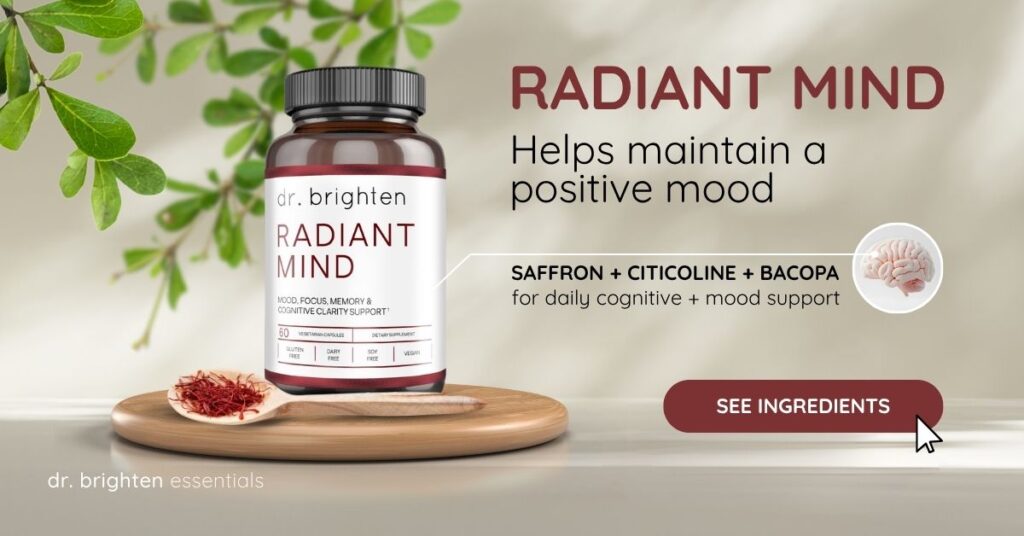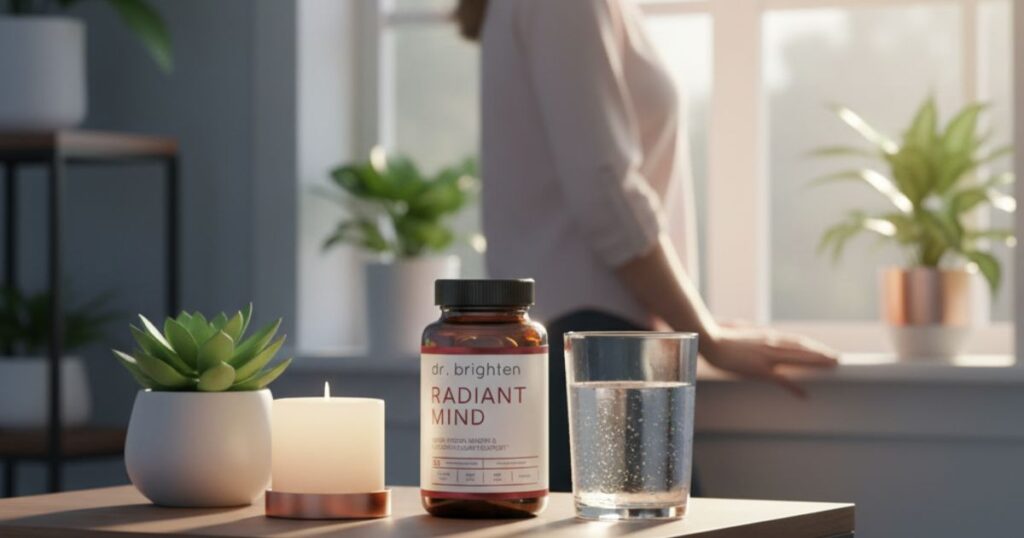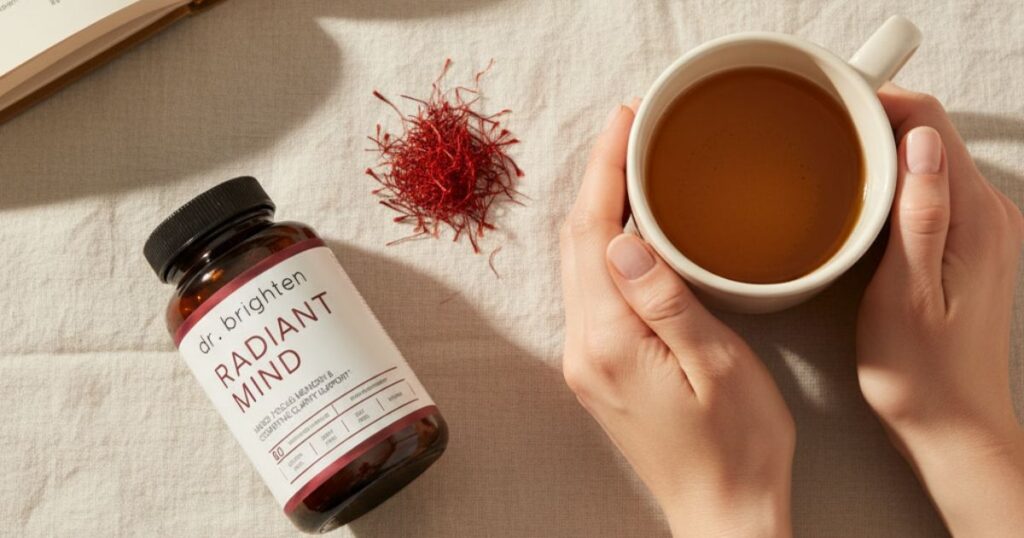If you’re struggling with low mood, persistent sadness, postpartum depression, or even just feeling “off” lately, you’re experiencing symptoms that affect just about everyone at some point—and you’re certainly not without options.
Depression affects about 1 in every 5 adults1 in the U.S. and is especially common among women, impacting nearly 25% at some point in their lives. Antidepressants are one of the most widely prescribed medications, taken by about 15% of adults (and 24% of women over 602), yet they can cause side effects in more than half of users3.
While many people turn to therapy or prescription medications for support for mood-related issues (and for good reason), others prefer to look toward natural remedies to complement these approaches. One of the most exciting and increasingly studied is saffron.
Yes, saffron—the vibrant golden-red spice you may know from paella or Persian rice dishes has been shown to be a natural mood booster. In fact, the research linking saffron to antidepressant effects is becoming too compelling to ignore.
Below, we'll dig into what the science says about saffron for depression and anxiety, how it works, the safest way to take it, and what to know before adding it to your routine.
In this article:
- Quick Summary: Saffron and Depression
- What Is Saffron and How Does It Work for Depression?
- Where Saffron Comes From (And Why It's So Special)
- Can Saffron Help With Depression? What Research Shows
- How Saffron Works in the Brain to Improve Mood
- Does Saffron Help With Anxiety and Stress?
- Saffron Supplement Side Effects and Who Should Avoid It
- FAQ: Saffron, Depression, and Mood Support
- Final Thoughts: Should You Try Saffron for Depression or Anxiety?
Quick Summary: Saffron and Depression
- What it is: Saffron (Crocus sativus) is a natural spice with powerful mood-supportive compounds like crocin and safranal.
- What it does: Clinical trials show saffron can improve mild to moderate depression and anxiety by balancing serotonin and reducing brain inflammation.
- Evidence: Multiple studies found saffron as effective as antidepressants like fluoxetine, but with fewer side effects. Note: saffron is not intended to replace medication.
- Typical dose: 30 mg/day of standardized saffron extract (such as affron®), taken consistently for 6–8 weeks.
- Bonus: Saffron may also support PMS-related mood swings and help ease emotional tension.
- Safety: Generally well tolerated; avoid high doses and consult your provider before use, especially if taking antidepressants or during pregnancy.
Try this: Radiant Mind™ by Dr. Brighten Essentials combines affron® saffron with bacopa, citicoline, and zinc for comprehensive mood and focus support.*
What Is Saffron and How Does It Work for Depression?
Saffron is a spice derived from the Crocus sativus flower. More specifically, it's found in the flower's atigma, the top part of the flower’s female reproductive system (called the pistil), which has a sticky surface that catches pollen during pollination.
Saffron is known as the world’s most expensive spice and has been used for over 3,600 years in traditional medicine across regions like Persia, India, and China, such as in Ayurvedic practices and Traditional Chinese Medicine. It's valued not only for its vibrant color and flavor, but also for helping to treat everything from low mood and indigestion to lack of libido.
Today, scientists are focusing on saffron’s potential as an antidepressant and anti-anxiety agent, with clinical studies showing real promise.
In fact, multiple double-blind, randomized controlled trials (the gold standard in research) have compared saffron extract to medications like fluoxetine (Prozac) and imipramine. The results show that saffron can be just as effective at reducing depressive4 symptoms, but with fewer side effects.
Where Saffron Comes From (And Why It's So Special)
Each Crocus sativus flower produces only three tiny stigmas, and it takes about 150,000 flowers to make one kilogram of saffron. No wonder saffron is one of the most precious herbs on Earth!
Modern analysis has found over 150 active compounds in saffron5. Its therapeutic properties come from phytochemicals like crocin, picrocrocin, and safranal6, which give saffron its vivid color, distinct taste, and powerful medicinal effects.
Here's more about two of the most powerful compounds present in saffron:
- Crocin: A powerful antioxidant that gives saffron its deep yellow-orange color and is thought to boost mood and memory. It may also protect brain cells7 from inflammation and oxidative stress and has been shown in studies to enhance learning and reduce depressive-like behavior8 in animal models.
- Safranal: This gives saffron its signature fragrance and is believed to help regulate neurotransmitters in the brain. It has been shown to modulate serotonin levels and may have sedative, anticonvulsant, and antidepressant properties, contributing to saffron’s calming effects that can help reduce mood swings.
Related: How Does Serotonin Affect Depression
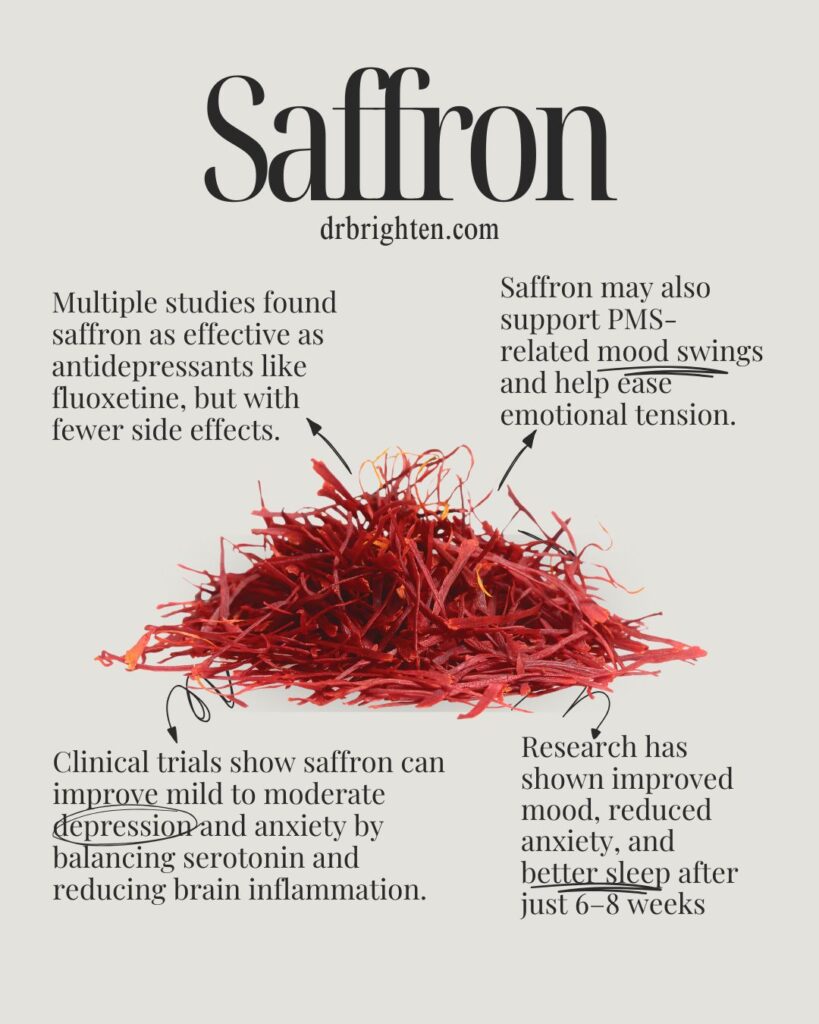
Can Saffron Help With Depression? What Research Shows
Yes—research shows saffron may be just as effective as certain antidepressants when it comes to improving symptoms of mild to moderate depression.
Here’s what studies show about saffron's effects:
A meta-analysis published in the Journal of Affective Disorders9 found that saffron significantly improved symptoms of depression compared to placebo and was just as effective as prescription antidepressants in several trials. In people with major depressive disorder, 30 mg of saffron daily10 (usually in extract form) led to improved mood, reduced anxiety, and better sleep after just 6–8 weeks of use (or 2 to 3 months).
Other reviews and studies11 have found similar results: saffron seems to be an effective way to help improve mood in many adults and is relatively low-risk. This is important, considering that antidepressant medications (like SSRIs) can often cause side effects12, such as insomnia, drowsiness, headache, and decreased sex drive. In comparison, saffron rarely causes side effects, making it worth a try in most cases.
How Saffron Works in the Brain to Improve Mood
You can think of saffron as a multitasker: it helps regulate neurotransmitters—including “feel-good” chemicals that can lift your mood and energy—and support overall balance in the brain13, which is important when we’re talking about depression and mood regulation.
Saffron's compounds mentioned above (like crocin, picrocrocin, and safranal) are thought to affect brain chemistry in ways similar to conventional antidepressants, such as by:
Increasing serotonin levels and dopamine activity:
Crocin and safranal can inhibit the reuptake of serotonin14 and dopamine, allowing more of these mood-regulating neurotransmitters to remain active in the brain. This action is similar to how SSRIs work and can help promote greater emotional stability, motivation, and resilience.
Reducing inflammation in the brain:
Chronic low-grade inflammation is a known contributor to depression and anxiety. Saffron’s anti-inflammatory effects appear to dampen the release of pro-inflammatory cytokines in the brain. This helps to create a calmer and more balanced internal environment.
Acting as an antioxidant:
Oxidative stress (which can occur from an unhealthy lifestyle and diet) can damage neurons and impair brain function over time. Crocin, one of saffron’s most studied antioxidant compounds, has been shown to help neutralize free radicals and support mitochondrial health. These effects help protect brain cells and potentially decrease neurodegeneration that is linked to mood disorders.
If you’re someone who struggles with focus, mood swings, or emotional regulation—especially around your cycle—check out my ADHD Woman’s Hormone & Brain Sync Guide. It’s a powerful resource to help you better understand how your hormones and brain chemistry interact, and how natural tools like saffron might fit into a broader support plan.
Related: Serotonin Deficiency – What's The Risk? and How to Increase Serotonin Levels
How to Use Saffron for Mood Support — At-a-Glance
| Goal | Typical Use | Pair With |
| Emotional balance / low-mood days | ~30 mg/day standardized extract; 6-8 weeks consistent use | Protein-rich breakfast, sunlight exposure |
| Stress resilience | ~30 mg/day standardized extract; 6-8 weeks consistent use | Breathwork (3–5 min, 2–3×/day) |
| Mental clarity & focus | ~30 mg/day standardized extract; 6-8 weeks consistent use | Hydration, movement breaks, citicoline or bacopa |
| PMS-related mood changes | ~30 mg/day standardized extract; 1-2 full cycles of consistent use | Magnesium at night, fiber-rich meals |
Does Saffron Help With Anxiety and Stress?
Does saffron help with anxiety? For many people, yes. While most of the research has focused on the connection between saffron and depression, findings from several studies suggest saffron can also help with mild to moderate anxiety.
Saffron seems to help calm the nervous system and improve emotional regulation15, possibly through boosting serotonin and influencing GABA signaling pathways.
A study published in the Natural Medicine Journal16 found that saffron significantly reduced anxiety and depression symptoms in adults simultaneously after 6 weeks of use.
Among teenagers with anxiety and depression, one study17 found that saffron taken for 8 weeks led to better moods, less tension, and improved sleep.
Another study18 found that saffron supplements helped decrease stress-induced changes in heart rate and improved overall resilience against stress and protection against the development of stress-related psychiatric disorders.
If you're looking for help coping with anxiety and depression (such as before your period), or issues like ADHD, other supplements that may also help include:
Related:
The HPA Axis and Healing Anxiety
The Anxiety Hormone Connection
Struggling with Sleep & Anxiety? Are Low Progesterone Symptoms to Blame
How to Take Saffron for Depression and Anxiety
If you’re curious about trying saffron for mood support, here are some important tips:
- Dose: Most studies have shown that between 28 to 50 milligrams (mg) per day19, often split into two doses, is enough to help improve people's moods. In some cases, higher dosages up to 100 mg or even more may be prescribed by healthcare providers for certain conditions, such as hypertension or vision problems.
- Form: Saffron supplements usually come in capsule or extract (dropper) form, which are standardized to contain 2% safranal or 3.5% crocin (the active ingredients).
- Purity: The best saffron supplements are those that are third-party tested, standardized for active compounds, and made without fillers or artificial additives.
- Timing: You can take saffron with or without food. If you find that it causes an upset stomach, try taking it later in the day with a meal.
- Duration: It's best to be consistent, since antidepressant results from saffron are usually seen after at least 4 to 8 weeks of daily use.
If you want a saffron supplement backed by research, look for one that uses clinically studied extracts like affron®, found in Radiant Mind™ by Dr. Brighten Essentials. It combines saffron with bacopa, citicoline, and zinc — nutrients that work synergistically to support mood, focus, and emotional balance.
What to Look For in a Saffron Supplement (Label Decoder)
| Checklist Item | What It Means |
| Standardized extract (e.g., affron®) | Identifies a clinically studied saffron extract with consistent actives (crocin/safranal) |
| Dose shown on label (≈ 30 mg/day) | Matches what many human studies use |
| Third-party tested | Independent testing for identity, potency, and heavy metals |
| Transparent sourcing | Country of origin and extract supplier named |
| Clean excipients | No unnecessary fillers, artificial colors, or allergens (where possible) |
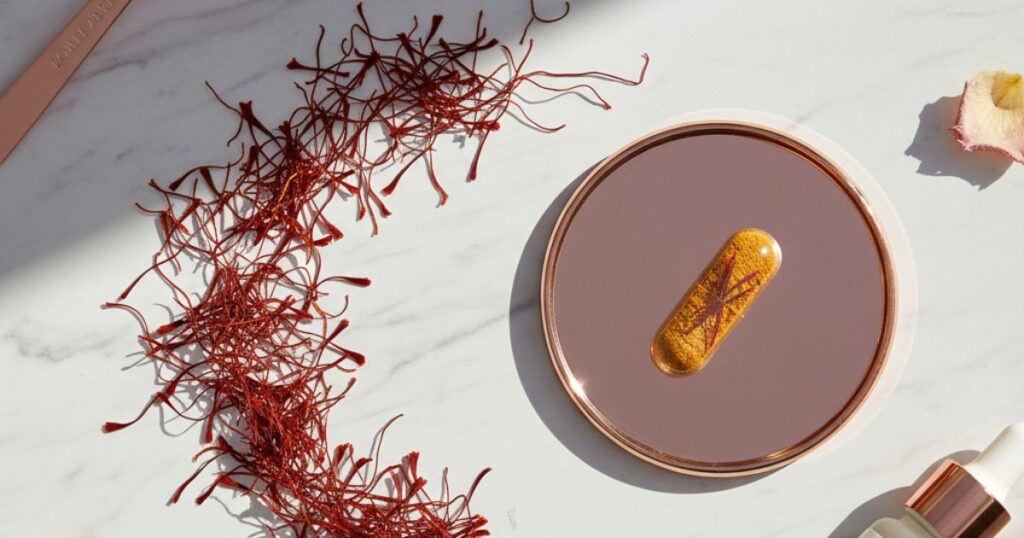
Saffron Supplement Side Effects and Who Should Avoid It
Saffron is generally safe and well-tolerated when taken at therapeutic doses (around 30 mg/day). Most people experience no significant side effects.
That said, some people taking saffron supplements may experience side effects like:
- Mild digestive upset (nausea or stomach discomfort)
- Drowsiness or headache
- Allergic reaction (rare, but possible)
It's important to avoid high doses, as more is not better. High saffron doses, typically above 5 grams, can be toxic, so never exceed recommended amounts. And always talk to your healthcare provider if you’re pregnant, breastfeeding, or taking medications for mood, blood pressure, or thyroid function.
If you're taking SSRIs or MAOIs, interactions with saffron are possible. Be sure to speak with your provider about the medication and supplements you're taking, especially when adding anything new. Discontinue use of saffron if you experience allergic symptoms, like rash or difficulty breathing.
Safety Snapshot: Using Saffron Supplements Wisely
- Typical Dose: 30 mg per day of standardized saffron extract (such as affron®), often split into two doses.
- Best Form: Capsules or standardized extracts verified for purity and active compounds (crocin and safranal).
- Common Side Effects: Mild nausea, headache, or drowsiness in sensitive individuals.
- When to Avoid: During pregnancy, while breastfeeding, or when taking SSRIs, SNRIs, or MAOIs—unless advised by your healthcare provider.
- Toxic Dose: High doses above 5 grams per day may be toxic and should never be used.
- Medical Advice: Always consult your provider before starting any new supplement, especially if you’re taking medications or have mood, thyroid, or blood pressure conditions.
Quality Tip: Choose products that are third-party tested for identity, potency, and heavy metals—such as Radiant Mind™ by Dr. Brighten Essentials, which contains clinically studied affron® saffron extract.
FAQ: Saffron, Depression, and Mood Support
The best saffron supplements are those made with clinically studied extracts such as affron® saffron extract, standardized for active compounds like crocin and safranal. Look for products that are third-party tested, use research-backed dosages (around 30 mg/day), and are free from unnecessary fillers.
One example is Radiant Mind™ by Dr. Brighten Essentials, which includes affron® saffron along with bacopa, citicoline, and zinc—nutrients that collectively support focus, mood, and cognitive resilience.
This information is for educational purposes only and is not intended to diagnose, treat, or cure depression. Always speak with your healthcare provider before starting any supplement.
Studies show saffron may help reduce mild to moderate anxiety and support emotional balance, likely through its effects on serotonin and GABA signaling.
In several clinical trials, saffron extract improved both anxiety and depression symptoms after 6–8 weeks of consistent use.
It may be especially helpful as part of a broader lifestyle plan that includes adequate sleep, movement, and stress management.
Most people begin noticing improvements in mood and motivation within 4 to 8 weeks of daily saffron use.
Like antidepressant medications, saffron’s effects build gradually over time as neurotransmitter balance and inflammation improve.
Consistency is key—skipping doses or taking it irregularly may delay results.
Saffron is generally well tolerated, but some people may experience mild nausea, headache, or drowsiness.
High doses—typically over 5 grams per day—can be toxic, so it’s important not to exceed recommended amounts.
Always choose reputable brands that disclose saffron concentration and source, and talk to your provider if you’re pregnant, breastfeeding, or taking antidepressants.
Saffron and antidepressant medications may both influence serotonin levels. Because of this, combining them can increase the risk of serotonin excess in rare cases.
If you currently take SSRIs, SNRIs, or MAOIs, consult your healthcare provider before adding saffron or any supplement.
Some preliminary studies suggest saffron may support mood and emotional well-being after childbirth, but more research is needed before drawing conclusions.
If you’re experiencing postpartum mood changes, it’s essential to talk with a qualified healthcare provider to develop a safe, comprehensive plan that may include therapy, medical care, and nutritional support.
Clinical trials typically use 30 mg per day of standardized saffron extract, often divided into two 15-mg doses. It can be taken with or without food, and consistency is important for results.
Radiant Mind™ by Dr. Brighten Essentials provides saffron in the studied form and amount, along with other nutrients shown to support mental clarity and focus.*
Use only as directed. Consult your healthcare professional if you have medical conditions or are using prescription medications.
Some head-to-head studies have found saffron to be similarly effective to fluoxetine (Prozac) for mild to moderate depression, with fewer side effects.
However, saffron should not replace prescribed medication without medical supervision.
It can be discussed with your provider as a complementary approach for mood balance.
Yes—research suggests saffron can help reduce irritability, mood swings, and anxiety that occur before menstruation.
This may be due to saffron’s ability to influence serotonin and lower inflammatory markers associated with hormonal mood shifts.
– Choose a standardized extract (2–3.5% crocin)
– Take 28–30 mg per day for at least 6 weeks
– Use third-party tested supplements like Radiant Mind™ that verify purity and potency
– Avoid high doses or combining with prescription antidepressants without guidance
Final Thoughts: Should You Try Saffron for Depression or Anxiety?
Saffron isn’t a cure-all, but it may be a helpful, natural addition to your mental health routine, especially if you’re dealing with mild to moderate depression or anxiety symptoms and are looking for complementary support.
Studies show that saffron, used as an antidepressant, is usually well-tolerated, backed by growing research, and offers a gentle way to nourish your brain and emotional balance. If you’re already working with a provider or therapist, bring up saffron and ask if it might be right for you.
References
- https://www.cdc.gov/mmwr/volumes/72/wr/mm7224a1.htm?s_cid=mm7224a1_w ↩︎
- https://www.cdc.gov/nchs/products/databriefs/db377.htm ↩︎
- https://pmc.ncbi.nlm.nih.gov/articles/PMC4970636/ ↩︎
- https://pmc.ncbi.nlm.nih.gov/articles/PMC6266642/ ↩︎
- https://pmc.ncbi.nlm.nih.gov/articles/PMC6266642/ ↩︎
- https://journals.lww.com/wtcm/fulltext/2022/08020/clinical_evidence_on_the_effects_of_saffron.2.aspx ↩︎
- https://pubmed.ncbi.nlm.nih.gov/36244518/ ↩︎
- https://pmc.ncbi.nlm.nih.gov/articles/PMC9000812/ ↩︎
- https://www.sciencedirect.com/science/article/abs/pii/S0165032713007970?via%3Dihub ↩︎
- https://pubmed.ncbi.nlm.nih.gov/29068592/ ↩︎
- https://www.mdpi.com/2072-6643/17/5/809 ↩︎
- https://pmc.ncbi.nlm.nih.gov/articles/PMC8395812/ ↩︎
- https://onlinelibrary.wiley.com/doi/10.1002/hup.2434 ↩︎
- https://pmc.ncbi.nlm.nih.gov/articles/PMC4643654/ ↩︎
- https://www.mdpi.com/2072-6643/17/5/809 ↩︎
- https://www.naturalmedicinejournal.com/journal/saffron-powerfully-modulates-anxiety-and-depression ↩︎
- https://pubmed.ncbi.nlm.nih.gov/29510352/ ↩︎
- https://pmc.ncbi.nlm.nih.gov/articles/PMC7882499/ ↩︎
- https://www.drugs.com/npp/saffron.html ↩︎

